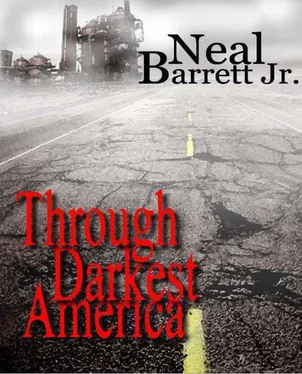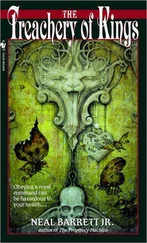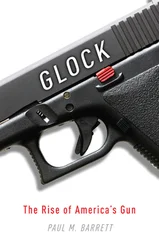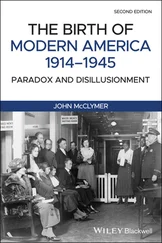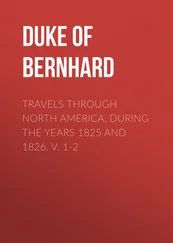“Kari?” he said softly, “you awake?”
“Uhmmmm,” she said sleepily.
“Kari, I think we ought to circle around real wide tomorrow, ’til we get pretty far from the city. Then I want us to head south. Real far, where it’s warm. That all right with you?”
“It’s fine with me, Howie,” she told him. “Whatever you think.”
She pressed warmly against him and wrapped one arm around his chest. In the half darkness he could look down and see the dim whiteness of her fingers on his shoulder.-He knew it didn’t mean anything at all but he could imagine that it did. “What happened to you, Kari,” he said suddenly. “Damn it I’m sorry, but I got to know that. I got to know what it was.”
She stiffened slightly but didn’t move. “You can’t leave anything alone, can you Howie?”
“Not that I can’t.”
“Pardo didn’t tell you!’
“He didn’t tell me nothing but High Sequoia. I don’t even know what it is.”
Kari was silent a long moment. “It’s a place where you can get whatever you want, Howie. That’s what it is. Whatever you want if you got the goods to pay. The best- whiskey and food and everything else.” Her voice was distant, as if someone else were talking and not Kari at all. “My daddy taught me how to fix guns. He was the best there was till the sickness took him. A man from High Sequoia saw me shopping in the market. I was going on twelve. I didn’t get away for four years. A man bought me and took me off. Me and a horse and two guns that didn’t work. I fixed one of the guns for him and killed him and ran off.”
“Oh, Lord, Kari…” He wanted to turn over then and hold her but knew better. “I’m sorry. I didn’t know it was something like that.”
“Why are you sorry, Howie? You’re always sorry about something, or thinking how you ought to feel. Don’t feel anything at all and you’ll be just fine. That’s something you’ve got to learn. I’m cold. I want to get some sleep. I don’t want to talk anymore.”
Howie tried to think of something to say, but knew there was nothing that would do either one of them any good. He felt her against him. Felt her there like something hollow, as if she’d died and didn’t know it. He knew this was close to the way it was.
When he woke in the gray dawn he was stiff with cold. He sat up and saw he was lying naked on the ground with nothing over him at all. The pistol was missing. Kari wasn’t beside him anymore. The horseblanket was gone; so was the horse.
By the end of spring he left the foothills of the high range behind. One day he turned, looked to the north, and saw that the distant peaks that had watched his path so long were only thin blue shadows on the far horizon. Ahead, the land stretched flat and hard. He knew he had reached the edge of the great southern desert.
The heat felt good. Sometimes he just stood and let the sun fill him. Bake him clear to the bone. He didn’t think he’d ever get too warm again.
He loved the desert and marveled at the strange, spiny green things that grew there. He wasn’t afraid of the land, but he respected it. He sensed that it could be cruel to a man who didn’t know its ways. He never tried to cross that great, barren space, but kept it beside him, so he could know that it was there.
The region that bordered the desert was nearly as dry and empty, but there was life there, too. Besides the green spiny things there were purple-gray bushes that hugged the earth and filled the air with dusty smells. Sometimes, there were stunted trees that looked like lean old men. He saw snicks and rabuts, and other things he couldn’t name. The further south he walked, the more creatures he saw.
There was water, usually from muddy streams no wider than his hand. He found a great, wide riverbed that stretched a mile or so from side to side. It was nearly as dry and parched as the desert, but there was water near its center, a foot or so beneath the harsh red soil.
He had little to eat. But he got used to that…
He couldn’t remember when he’d last seen another person. There had been some earlier, in the foothills. He’d sometimes stolen from them. Food and clothing and, once, a knife. But he hadn’t tried to talk to anyone. He didn’t want that. Not soon.
He followed the dry riverbed down the long, endless miles, always keeping the desert in his sight. He decided the riverbed was a kind of border, separating the land where a man could live from where he couldn’t.
He lost count of the days. There was warm sunlight, and there were cold stars. There were days with food and water, and days without. Each day began and ended much the same as the one before. Until the morning he woke, sat up, and saw the man.
He was walking just on the edge of the horizon to the south, moving from east to west across Howie’s path. Behind him trailed a small herd of stock. One, two, three, Howie counted. Four, five, six, seven… eight. Hardly even big enough to call it a herd.
He was greatly surprised to see a human being. Why should that be, he wondered? Another man could be out here in the middle of nowhere. He was.
He wasn’t sure how he felt about the man. He was sure he didn’t want to talk to him. If he just sat where he was, the man would disappear in a little while and he wouldn’t have to worry.
He didn’t want that, though. He wanted to see the man, but he didn’t want the man to see him. He didn’t understand why this was so, but it was.
It wasn’t hard to follow a man in the wastelands. He couldn’t get away from you. All you had to worry about was getting too close. If you could see forever out across the desert, so could he.
Howie kept out of sight during the day. After dark, he’d wait until the man built a fire and then he’d move in some. He never got too close. He just sat quietly in the dark watching the man’s shadow move about the fire. After a while, he’d crawl back to his place, pull his blanket about him, and go to sleep.
Before he slept, though, he thought about the man. What kind of man was he? He’d never gotten close enough to tell. What did he do? Did he live out here? He sure wasn’t making any kind of living hauling eight head of stock around. Maybe he was just trying to get away from other folks, too.
He’d think about things like that, or guess what the man’s name might be, or how old he was. And then he’d go to sleep.
One morning, about a week after he’d first seen the man, Howie woke up with a start, knowing something was wrong. The man stood right above him, big boots spread wide and a heavy, long-handled axe in his hands.
Howie didn’t move.
“That’s right,” said the man. “Just stay quiet like.” He nodded toward Howie’s belt. “Slide that knife out slow and toss it aside.”
Howie did as he was told.
“You got anything else on you?”
“No.”
“What’s in your pockets?”
“Some nuts. And a couple of them, green fruits.” The man looked at him. “What kind of fruits?” “The kind that grows on the end of sticker plants.”
The man almost grinned. “You eatin’ cactus buds, are you?”
“I eat whatever I can get.” Howie couldn’t hold back any longer. Ever since he’d opened his good eye he hadn’t been able to take his gaze off the man. Strong, wide chin, dark eyes, a broad nose, and—he was black! Just as black and shiny as pitch!
“Something bothern’ you?” asked the man.
“You, I reckon,” said Howie. “Damn… you ain’t a nigger , are you?”
The dark face didn’t change. He motioned with the axe. “Get on up.”
Howie did. “What you goin’ to do with me?”
The man slung the axe over his shoulder and scratched his belly. “First I’m goin’ to ask you why you been sniffin’ my heels for ’bout a week. Sittin’ behind bushes and watching a man eat his supper.” The man made a face. “You got to have some reason for doin’ somethin’ like that.”
Читать дальше
